View from the 5th – August 2013

August 2013 – The Next Chapter
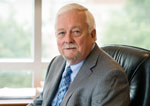
Students have returned once again to Chapel Hill and our campus is buzzing with activity. Fall is always an exciting time on campus with a sense of new beginnings and promise for the future. We at the Health Sciences Library (HSL) are experiencing our own transition following the retirement of Carol Jenkins on June 30, 2013. I had the pleasure of working with Carol for most of my career and I am very proud to be taking over the leadership of this wonderful library. This is a job I have aspired to for my entire professional career and I am excited to take the HSL to the next level.
In this issue, you’ll learn more about what HSL librarians do to help new students in each of the five health affairs schools transition smoothly into the next chapter of their academic lives. You’ll also learn about Carolina’s very successful year in securing research funding and the HSL’s role in supporting those efforts. You will also get to meet our new Cancer Information Librarian and learn more about how her work will support cancer research and patient care at Carolina. Finally, you can learn a bit more about my career, including 19 wonderful years here at HSL.
In addition to these more in-depth stories, I am happy to share with you the final version of our latest Strategic Plan. As you may recall from prior issues of this newsletter, this plan was developed jointly with our other library partners on campus and will help shape the work of all of us until 2018. The vision, priorities and goals in this plan represent the input of hundreds of librarians, staff members, faculty and students and we believe it will help the libraries at Carolina continue to be leaders in our field.
Finally, I would like to invite those of you who are able to join us at the HSL on Thursday, Sept. 26 at 4 p.m. as we host Francine Netter. Ms. Netter will be discussing her book “Medicine’s Michelangelo,” a remarkable and comprehensive biography of her father and famed medical illustrator Dr. Frank Netter.
The beginning of a new Academic Year offers many interesting possibilities for what will be a part of this next chapter. One thing that will continue into this chapter and those to follow will be our Library’s commitment to providing the highest levels of support to teaching, learning, research and patient care. We are able to provide this margin of excellence to our users thanks, in part, to your generous support. Thank you for investing in our work and for helping to make the next HSL chapter an amazing one.
Sincerely,
Jim Curtis
Interim Director, Health Sciences Library
In this Issue:
- New Students Receive Warm Welcome
- UNC Secures $777.8 Million in Research Funding for Fiscal Year 2013
- HSL Welcomes New Cancer Information Librarian
- Meet HSL’s New Interim Director
New Students Receive Warm Welcome
A new Academic Year is upon us and the librarians at the Health Sciences Library (HSL) are excited to welcome new incoming and transfer students to Chapel Hill. Students at each of the five health affairs schools all receive library orientations as part of their first weeks of classes. And just like everything we do for our users, these orientations are customized to the unique needs of each user group.
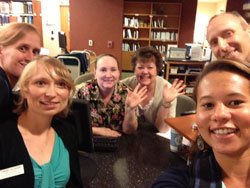
a photo with HSL staff
Scavenger Hunts
Many new students in the Department of Allied Health Sciences will learn about the library and get comfortable in this new setting by participating in a fun and interactive scavenger hunt in the library and online. Students pick their own small groups and are able to participate in the hunt at their convenience over the course of a week. Not only do the students have more fun while learning, this approach helps HSL staff improve the findability of items in our library and on our website and is less disruptive for others in the library than traditional group tours.
Literature Search Critiques
The Dentistry Liaison Librarian helps first-year dental hygiene students gain information discovery and management skills, which they then practice using in-class assignments. First-year DDS students take an Evidence Based Dentistry course and learn and practice how to find research articles, closely integrated with the course director’s instruction about how to critically appraise the literature. The students receive expert critiques of their literature searching from their liaison librarian.
PubMed Skills
First-year medical students will take a completely revised and required PubMed competency module. They will also have an in-person session with their liaison, followed by many opportunities throughout the year to consult her in person or online.
Citing Appropriately
All first-year graduate nursing students will complete required online modules developed by HSL librarians on plagiarism and an orientation to library services. Their official records are updated with a certificate of completion.
“How To…” Help & Office Hours
All students and faculty in all departments of the Gillings School for Global Public Health are able to get to selected, high-quality information resources in their subject areas of interest through 11 targeted online web guides. These guides, created by the liaison librarian, received close to 5,000 hits this past year. Public Health students can also meet with the liaison informally during her “office hour” every Thursday in the atrium of the Michael Hooker Research Building.
Connecting Across the State
All students in the first-year Pharmaceutical Care Lab sessions on information skills are able to complete their assignments on their own computers and in their own time thanks to a redesign of the sessions coordinated by the Pharmacy Liaison Librarian. All students in the course, including students on campuses in Elizabeth City and Asheville, had equivalent access to resources. The lab instructor gained some time back in her sessions, which was used to improve another course.
Connecting Again
Finally, all of our liaison librarians offer special attention to students who are coming back to school following a significant period of time after college graduation. Many of these students feel overwhelmed when they encounter a large, modern, academic library and need help navigating the massive amount of electronic information that the HSL provides.
And all students, faculty, staff, alumni, and citizens can connect with HSL and get help through Ask A Librarian https://asklib.hsl.unc.edu/
UNC Secures $777.8 Million in Research Funding for Fiscal Year 2013
Faculty at UNC-Chapel Hill secured $777.8 million in research funding during fiscal 2013. That total is up nearly $11 million – 1.4 percent – from $767.1 million the previous year. The funding comes in contracts and grants awarded by federal and state agencies, foundations, nonprofit organizations, corporations and associations.
“These results are a remarkable tribute to the work our faculty are doing to improve people’s lives, to make sure North Carolina is a global research and development leader, and to make the world a better place,” said Chancellor Carol Folt.
“With a difficult economy and continued funding cuts in many of the federal agencies, a number of universities are losing ground in their research funding,” she said. “Carolina is bucking the national trends, and our state and region are benefiting as a result.”
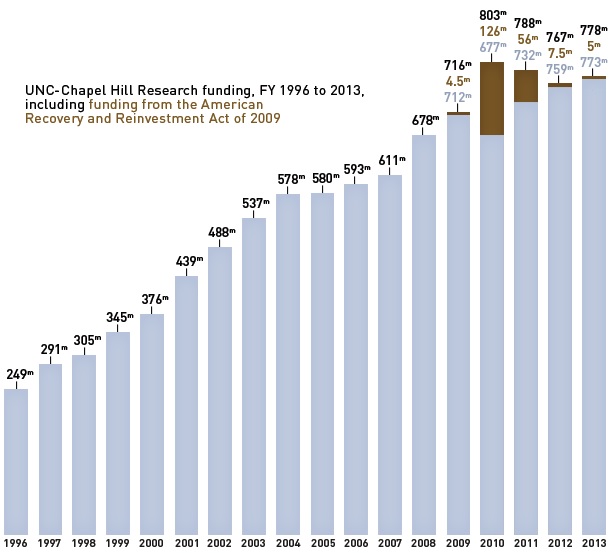
Faculty with primary appointments in the five health affairs schools brought in $586.8 million, or 75 percent, of the total funding. These faculty members use the Health Sciences Library as their primary source of information to support, enhance and inspire their research efforts. Many of them also call upon our librarians to help them with search strategies, data management, citation help in their papers, National Institutes of Health (NIH) Public Access compliance and to find new sources of funding for grants.
“It’s the best possible place to be to do research and to teach because there are so many resources available here that just might not be available at a smaller institution,” said Dr. Cara McComish, Assistant Professor in the Department of Allied Health Sciences. “I feel very lucky and privileged to have that at my fingertips.”
The NIH remained the University’s largest funding source, providing $366.9 million, or 66.9 percent of federal research dollars. NIH’s strong and ongoing support reflects the extraordinary reputation of our health-related professional schools (Dentistry, Medicine, Nursing, Pharmacy and Public Health), UNC Health Care and its teaching hospitals, and basic and social science units in the College of Arts and Sciences.
The University’s other top funders were the U.S. Agency for International Development, $49.7 million (9.1 percent); National Science Foundation, $39.3 million (7.2 percent); and U.S. Department of Health and Human Services, $38.1 million (7 percent).
The University’s multidisciplinary research centers and institutes continue to play a growing role in bringing research funding to North Carolina, accounting for roughly $160 million of total awards in 2013. These centers and institutes attract close to $7.70 in external funds for each $1 of state funds invested.
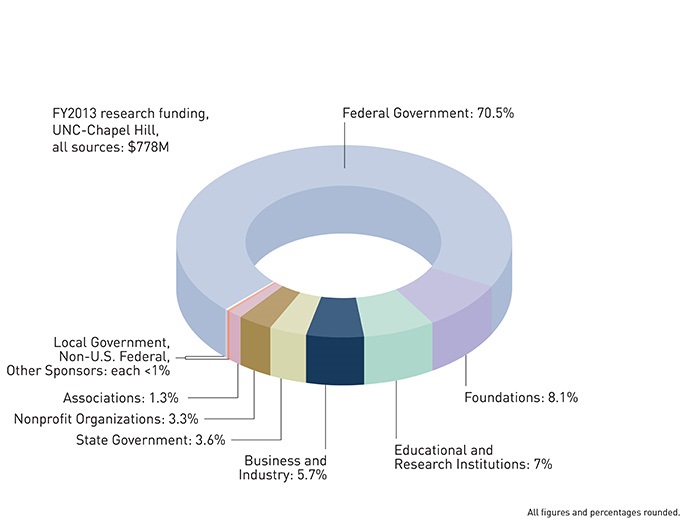
One factor in this year’s success, Folt said, was diversifying funding sources and bringing in more dollars from foundations and private industry and business. “This is a healthy trend, and one we hope will continue.”
Folt emphasized the importance of the historic commitment of the N.C. General Assembly, taxpayers and the University to making wise investments in new research facilities and infrastructure such as the Carolina Physical Science Complex and the Genome Sciences Building dedicated last fall. Such innovative facilities have made possible ground-breaking interdisciplinary scientific research, which has had a direct and positive impact on bringing in research dollars, she said.
“These investments will continue to pay huge dividends for the University and for the people of North Carolina, supporting thousands of jobs, leveraging the state’s investment, and providing economic and other benefits to communities across the state,” Folt said.
Examples of research programs funded by fiscal 2013 federal grants include:
- A School of Medicine clinical trial made it possible for a multidisciplinary medical team to place an auditory brain stem implant in a deaf 3-year-old Charlotte boy, allowing him to hear his father’s voice for the first time. The YouTube video created by UNC Health Care has been viewed by more than 2 million people around the world.
- The Carolina Population Center’s National Longitudinal Study of Adolescent Health follows a nationally representative sample of U.S. adolescents who were in grades 7-12 in 1994-95. The goal is to understand how adolescent and early adulthood experiences, behaviors and social contexts influence well-being in young adulthood. The center uses an integrative approach combining social, behavioral and biomedical sciences.
- A recent study led by nutrition faculty at the Gillings School of Global Public Health found that foods rich in specific amino and fatty acids helped youngsters with Type 1 diabetes keep producing some of their own insulin for up to two years after diagnosis. The study involved more than 1,300 participants in a multi-center research program that is the largest study of childhood diabetes in the U.S. The diet additions did not reduce the need for supplemental insulin, but may help reduce future disease complications.
Read more at UNC Research.
HSL Welcomes New Cancer Information Librarian
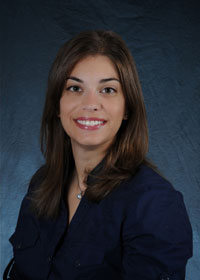
The Health Sciences Library (HSL) at The University of North Carolina at Chapel Hill is proud to welcome Jennifer Walker as our new Cancer Information Librarian.
Walker will identify information needs and maintain outreach services to faculty, students, researchers and staff from the five health affairs schools (Dentistry, Medicine, Nursing, Pharmacy and Public Health) as well as clinicians and patients at UNC Hospitals and to the citizens of North Carolina.
“Carolina has an amazing reputation for cutting-edge cancer research and outstanding patient care,” said Walker. “I’m delighted to have this wonderful opportunity to support that work and to be a part of one of the best libraries in the country.”
The Cancer Information Librarian position is technically new, but it continues and expands on work that the HSL has been doing since 2008. During that year, the HSL received The University Cancer Research Fund Clinical Innovation Award for a Cancer Information Specialist. That award resulted in several key accomplishments such as:
- The research team of the Comprehensive Cancer Support Program received timely “best evidence” on a weekly basis to inform decision-making and also learned how to save references for future use in articles and grant proposals.
- Members of cross-disciplinary listservs for cancer survivorship (reaching 90 researchers, clinicians, and community partners) and breast cancer (reaching over 50) now receive monthly search results on key topics of interest to them.
After the one-year funding ended, HSL Librarian Jean Blackwell continued to serve the Comprehensive Cancer Support Program. Blackwell also created a website for those involved in the nutritional aspects of cancer patient care that links to automatic searches of the literature. Following Blackwell’s retirement at the end of 2012, the HSL began the process of developing the job description for the Cancer Information Librarian and conducting a national search for the position. Walker will work closely with Clinical Librarian, Karen Crowell, who provides services for surgical oncology, GI surgery, urology, and other specialty patient care teams.
Prior to joining UNC, Walker served as the Nursing Liaison Librarian for East Carolina University where she worked with students, faculty and clinical staff nurses. She has also held positions at John Hopkins Bayview Medical Center in Baltimore, MD, and at Sacred Heart Hospital in Pensacola, FL.
Meet HSL’s New Interim Director
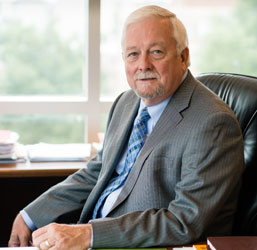
The Health Sciences Library (HSL) is proud to welcome Jim Curtis as Interim Director. Curtis, who received a Masters’ of Library Science in 1980 from the School of Information and Library Science (SILS) at The University of North Carolina at Chapel Hill, previously served as the HSL’s deputy director from 2008 to 2013.
“I am delighted to have this opportunity to lead this great library, which is one of the very best health sciences libraries in the country,” said Curtis. “I look forward to continuing to build on its strengths during my tenure as Interim Director.”
Curtis has a total of 33 years of experience in librarianship, including 19 years working in three different administrative positions at the HSL beginning in 1990. He left UNC in 2004 to serve as Director of the Savitt Medical Library at the University of Nevada’s School of Medicine in Reno, NV, where he also was a Professor in the School of Medicine and head of the school’s Information Technology Services.
Curtis is the current Chair of the Leadership and Management Section of the Medical Library Association (MLA), a former member and chair of the Lindberg Research Fellowship Award Jury and served for three years on the North Carolina Library Services and Technology Act Advisory Committee. In 2010 he published several major articles focused on evidence-based medicine and possible roles for librarians and library resources with the implementation and maintenance of electronic health records. He is a member of the Librarians Association of UNC-CH, the Mid-Atlantic Chapel of MLA, the University Managers Association and MLA.
During his time at SILS, Curtis was President of the Library Science Students Association, an audiovisual assistant and a member of the Block, a curriculum innovation at the time that allowed students to learn in a professional setting. He is also a member of the Epsilon Chapter of Beta Phi Mu, the library honor society. Curtis received a Bachelor of Arts in European History from the University of Illinois at Urbana-Champaign.






